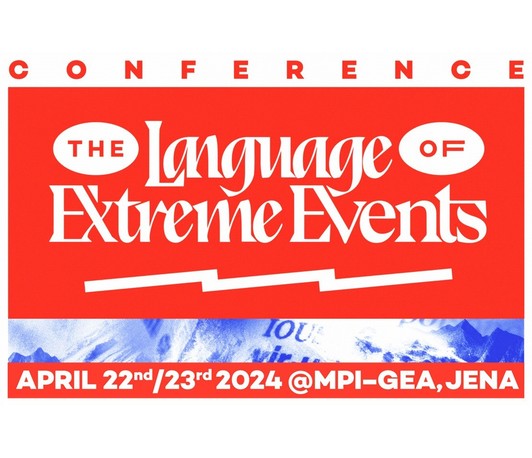The Language of Extreme Events
- Start: Apr 22, 2024
- End: Apr 23, 2024
- Speaker: Various
- Location: Max Planck Institute of Geoanthropology
- Room: Villa V03 and V14
- Host: Martine Robbeets and Huw S. Groucutt

The notion of ‘extreme events’ is widely discussed in various disciplines, and is a topic of increasing academic research. Rapid and dramatic environmental and climatic events are particularly prominent in this – including heat waves, volcanic eruptions, droughts, earthquakes, floods, etc. Several of these are forecast to increase in frequency and severity given current anthropogenic climate change, as widely discussed by organisations such as the Intergovernmental Panel on Climate Change.
However, it can be argued that virtually all disciplines contain somewhat analogous debates, about the role of extreme events in contrast to more gradual processes as drivers of oscillation and change. In archaeology, for instance, notions such as the ‘human revolution’ and ‘Neolithic revolution’ have been central themes of debate. In palaeontology, there has been a long discussion between advocates of evolutionary gradualism and the notion of punctuated equilibrium.
Even if similar notions mark the archaeolinguistic debate, linguistics has been relatively slow to engage with the topic. However, it should be acknowledged that extreme climatic events and natural disasters have had profound impacts not only on our planet’s biodiversity and cultures, but also on its languages. Geoanthropology studies present and past interactions between humans and the Earth system, traditionally integrating fields such as Climate science, Earth system science, Ecology, Environmental history, Archaeology, Economics, Law, Anthropology and Political sciences. Our conference suggests to add linguistics to this list and will stress the relevance of archaeolinguistics for the field of Geoanthropology.
A key objective of this conference is to bring together diverse methodologies and perspectives on the topic of extreme events. These will range from the definition of extreme events – such as events occupying the margin of a distribution (e.g. top/bottom 1% of annual rainfall for a particular location, or alternatively another perspective such as a transition between stable states – to particular case studies.
The aim of the conference is to both present the state of the art on research that can be related to the notion of extreme events in particular disciplines and also to consider and develop cross and multi-disciplinary perspectives. Our contention is that there are many analogous discussions in different disciplines, and that talking outside our usual comfort zone is likely to be a productive exercise.
Panel - Extreme Events and Language dynamics
Scholarly opinions differ as to which events should be considered “extreme” (for a review Stewart et al. 2022) but using the term “extreme event” in the title of our conference, we aim at high-impact, unanticipated natural events such as unusual climate change and natural hazards and we take the Holocene (9 700 BC – 1 950 AD) as our time scale. Abrupt climate events, such as for instance, the Holocene climate optimum (c.7500-3500 BC), the Meghalayan drought (c.2 200 -2 000 BC), the Medieval Climate Optimum (c.950–1250 AD) and the Little Ice Age (c. 1300–1850 AD) can be described as unusual climatic periods that altered the ecosystem. Natural hazards are disasters, such as floods, tsunamis, earthquakes, and volcanic eruptions, that caused damage and loss of ecosystems and environmental resources.
In our panel we want to explore how language has responded to such extreme events during the Holocene. We invite general approaches as well as case studies of particular language families or areas that can shed light on the following questions:
- How is the impact of extreme events reflected in language? How have extreme events changed language structure (phonology, vocabulary, morphology)? How have they impacted linguistic diversity? How have they driven language dispersal?
- What properties make languages resistant and resilient to extreme events? What are the alternatives to language death in case of extreme events? What prevents language death?
- How important are extreme events for language dynamics? Can we set up models of language change involving extreme (punctuation) events? How can we demonstrate a causal relationship between extreme events and language dynamics?
- Did specific climate events such as those mentioned above, which are thought to have played important roles in precipitating cultural change and population migration and collapse also affect languages around the globe? And if so, in what way?
- How can knowledge of the impact of extreme events on language in the past, help us to understand the present and work out sustainable linguistic solutions for the future?
In our panel, we would like to address these questions from an interdisciplinary perspective. To this end, we will apply a “tandem approach”, meaning that we invite a linguist on condition that (s)he can extend the invitation to one non-linguistic co-presenter (a palaeoclimatologist, archaeologist, geneticist, etc.). The resulting presentation is expected to be a joint presentation of ca. 30 minutes on a common research question.